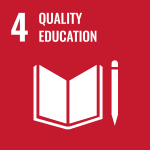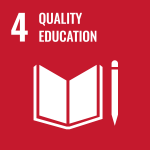2023-24 Sustainability in Curriculum Progress
Learn about what Concordia is doing to advance its 2025 sustainability in curriculum targets.
On this page:
CURRICULUM ADMINISTRATION SUPPORTS
Target: Develop and deliver supports within the administration and delivery of the curriculum
Status
- Complete
Efforts supporting this target
Curriculum Developer
A curriculum developer was hired from 2022-24 to develop resources that support the implementation of sustainability into the curriculum by faculty.
Sustainability Co-Design Project
A program designed to assist instructors who wish to introduce sustainability content in their course, based on a Student as Partners model.
Program results:
- 15 courses redesigned over 5 editions: Summer 2022, Fall 2022, Winter 2023, Fall 2023, Winter 2024.
- 15 faculty instructors and 16 faculty peer mentors, for a total of 31 faculty members
- 31 students as partners
- "Exchange of ideas was the best thing, openness to new ideas and pushing the limits of the conventional" – Student
Faculty Interest Group on Education for Sustainability
The group met monthly to infuse sustainability in courses and identify opportunities to facilitate this process across all faculties. The faculty interest group is a dynamic collective of 11 dedicated faculty members who have come together to champion education for sustainability at Concordia.
The FIG was responsible for the co-creation of the faculty-curated sustainability content for teaching. This resource highlights themes in sustainability education, accompanied by a range of practical resources contributed by experienced faculty members at Concordia. Published on CTL web page.
Faculty consultations
The English and Math & Statistics department received department consultations from the curriculum developer. Three one-on-one consultations on a course were given by the curriculum developer.
Publication of new web resources
- Pressbooks: A guide to embedding education for sustainability in higher education courses. This substantial online guide is a comprehensive go-to resource for anyone interested in embedding sustainability in their course and should help promote education for sustainability at Concordia.
- Sustainability Co-Design Project Stories and case studies: Includes a series of 5 blog posts and 5 matching one-pager case studies summarizing the story and process of several Co-Design Teams and their outcomes (goals, learning outcomes, assignments and assessments). The case studies will also showcase one artefact the teams produced. The goal of these resources is to showcase faculty who have successfully embedded sustainability in various disciplines, even though they were not seasoned in sustainability teaching. It should also inspire other faculty to start incorporating sustainability by showing its feasibility and added value.
- Faculty Interest Group co-created resource: Faculty-curated sustainability content for teaching. This resource illustrates key aspects of sustainability through sharing exemplary resources on several themes and supports faculty members across the curriculum by providing materials for teaching sustainability to be used in the classroom.
- Sustainability webinar: Sustainability Sparks: Faculty Resources for infusing Sustainability in the Curriculum. This webinar includes an explanation on why and how to teach and learn sustainability, mentioning a few disciplinary examples. It also showcased the outcomes of the Sustainability Co-Design Project, inspiring faculty to include sustainability content in their own curriculum. A video recording is available (Concordia netname access is required).
Calls to action
Explore our web resources and bring sustainability into your teaching!
INCREASE SUSTAINABILITY RELATED COURSES & PROGRAMS
Target: Achieve a 20% threshold of sustainability-inclusive* courses
*The wording has changed from sustainability-related to sustainability-inclusive for continued consistency with the Sustainability Tracking, Assessment and Rating System (STARS) framework
Status
- In progress
Efforts supporting this target
Fifteen courses were redesigned to include sustainability through the Sustainability in Curriculum Co-Design Project (more information in the section above)
Open-access Sustainability Course: This course is envisioned as a blended open-access, interdisciplinary course on sustainability, designed to include personalized pathways for learning. Consultations with different stakeholders were held in November 2023. Faculty leads are confirmed with instructional design support provided by the CTL to begin the development.
Mapping Sustainability Curriculum at Concordia: A new survey for faculty members was disseminated in August 2023 to all full and part-time faculty members. In the survey, faculty members identified whether their courses have sustainability content or not. It also provided insights into content, instructional design and teaching approaches related to sustainability (complete).
Calls to Action
Students, consult the list of sustainability courses offered at Concordia and register!
Faculty, email sustainability@concordia.ca if your sustainability courses are not represented in the list of sustainability courses.
Read the Mapping Sustainability Curriculum at Concordia report.
Related Sustainable Development Goal

Target: Increase the number of programs available to students that have a sustainability learning outcome
Status
- In progress
Sustainability programs at Concordia
Concordia University offers over 50 undergraduate, graduate and professional certificate programs that will help enhance your understanding of sustainability.
Programs and certificates listed in below have sustainability learning outcomes, meaning that they are:
Specifically focused on sustainability;
Include sustainability-focused learning objectives; or
Require successful completion of a sustainability-focused course
Efforts supporting this target
Graduate Microprogram in Sustainability (SGS): This course-based graduate microprogram launched during the Summer 2024 semester provided students with cross-disciplinary expertise in sustainability from all four faculties at Concordia whilst offering opportunities for students to address real-world sustainability issues through supervised independent projects. A variety of students enrolled in the program’s inaugural year, including graduate students, alumni from diverse disciplines and professionals pursuing further education. The students’ expertise ranged from business (MBA) to ecology, public policy and public administration, human systems intervention, and education. The 10 faculty members who instructed the program represented all four faculties, covering departments such as Geography, Planning and Environment, Education, Accountancy, the Loyola College for Diversity and Sustainability, Political Science, Biology, Design, Journalism, and the Centre for Engineering in Society.
Microprogram in Sustainability: This 15-credit Undergraduate Microprogram in Sustainability Principles will be offered by the Loyola College for Diversity and Sustainability in the Fall 2025 and is accessible by any student who wish to gain basic literacy in sustainability. It is offered both in-person and online and supports the development of a specific set of transferable sustainability competencies, through a cross-disciplinary cluster of courses.
Certificate in Applied Sustainability (development in progress): This 30-credit Undergraduate Certificate in Applied Sustainability is conceived as a stackable credential building off of the Microprogram in Sustainability Principles. Students would develop skills in integrating knowledge of sustainability into a social context, measuring and evaluating sustainability practices and designing sustainability programs .
The Student Sustainability Ambassadors Program (SAP) provides select students with an immersive sustainability leadership experience. It provides creative engagement opportunities that build students’ skills and competencies as they support a culture of sustainability on campus.
Calls to Action
Register and learn more about sustainability programs and certificates at Concordia
Learn more about the Student Sustainability Ambassadors Program
Related Sustainable Development Goal
